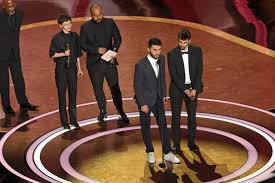There have been years when we've seen most or all of the Best Picture candidates for the Oscars before the glittering telecast. Not this year. In fact, Conclave was the only one. Our local multi-plex is much more inclined toward low-brow blockbusters than Indie films and we just didn't go elsewhere to see some of the nominees.
One documentary we really want to see is the Oscar winner, No Other Land. We may be waiting awhile because even though it has won a number of awards it doesn't have a North American distributor and it isn't streaming anywhere. That's because it's about the decades-long occupation by Israel of what's known as the West Bank. We've heard so much about Gaza during the the past 17 months, home to 2.1 million Palestinians. There are roughly 4 million people in the West Bank, with 3.3 million Palestinians and 700,000 Jewish settlers in what the United Nations has declared illegal settlements. Here is the description of the film from Al-Jazeera:
No Other Land, which chronicles settler violence and the Israeli demolitions of Palestinian homes in the occupied West Bank, won the Oscar for best documentary on Sunday night.The film has won dozens of prizes since its release last year, including at the Berlin Film Festival and the New York Film Critics Circle Awards.
The film was produced from 2019 to 2023 and comprises mostly personal camcorder footage filmed by Palestinian activist Basel Adra, 28, who documents the Israeli military’s destruction of his hometown, Masafer Yatta in a small, rugged region in the southern occupied West Bank.
The film highlights Israeli demolitions of homes in the village, which the Israeli military wants to turn into a military training zone. Its footage shows the Israeli military razing a school and filling water wells with cement, so residents cannot rebuild.
Adra made the film with Israeli journalist Yuval Abraham, who co-directed it along with Palestinian filmmaker Hamdan Ballal and Israeli filmmaker Rachel Szor.
So, a doc made by an Israeli and a Palestinian which can't get a distributor because it addresses some stark realities that go back to 1967 and even before then. The BBC described the Oscar presentation and the response of the film-makers.
The acceptance speech at the 97th Academy Awards was one of the most overtly political moments of the night.
Yuval Abraham said his life was very different to that of his colleague, Palestinian journalist Basel Adra. "When I look at Basel, I see my brother, but we are unequal," Abraham told the audience.
Their win comes amid a fragile ceasefire between Hamas and Israel, pausing fighting for an exchange of Israeli hostages and Palestinian prisoners.As they won their Oscar on Sunday night, Abraham and Adra took to the stage with colleagues Rachel Szor and Hamdan Ballal to pick up the award.
Abraham said: "There is a different path, a political solution, without ethnic supremacy, with national rights for both of our people.
And I have to say, as I am here, the foreign policy in this country (the US) is helping to block this path." The audience cheered. Adra thanked the Academy and said he became a father two months ago."I hope to my daughter that she will not have to live the same life I am living now, always fearing settlers' violence, home demolitions and forceful displacements."
Two years ago while in Israel we drove within a few hundred metres of the West Bank separation fence several times as Ruth's family members lived close at hand. We could see the settlements but we couldn't have any meaningful conversation about the situation because most residents of Israel have strong opinions about the sequestration of Palestinians.and don't want to talk about injustices
.As a Christian I want to be informed and to find ways to respond. Amongst those Palestinians are Christians in Bethlehem, birthplace of Jesus, who deserve our support as well.




No comments:
Post a Comment